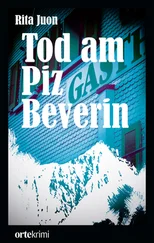Whilst the funeral service was being performed inside the church, most of us men stood outside. This group of standing figures, solemn and still, always looks dwarfed by the mountains. We spoke in low voices, about the murder. Everyone was agreed that the police would never discover who the assassin was. Each said this as if he himself had a clear idea of the truth. She was fearless, they said, this had been the Cocadrille’s trouble.
When the coffin came out of the church, the crowd followed it in procession through the cemetery. Nobody spoke now. The coffin was so small that it made you think of a child’s funeral. It was in the cemetery that I first heard her voice. I had no difficulty in hearing what she said, although she was whispering.
Do you want me to say who it is? He’s among you, he’s here in the cemetery, the thief.
The murderer, I muttered.
It’s the thief whom I cannot forgive!
Her voice made me frightened. I realised that the others could not hear it. My fear was that she would shout, and it would become obvious by my reactions that I could hear something.
What would you do if I shouted his name? she said, realising my thoughts.
They won’t hear.
You will hear me, Jean, you can hear me if I say Jean, can’t you.
Yes, I said, and made the sign of the cross over her coffin.
When once the coffin was passed, the procession shuffled forward more quickly.
It wasn’t me.
You thought of killing me.
Outside the cemetery gate her brothers Edmond and Henri stood by the wall traditionally reserved after funerals for the closest of kin. If stones could feel, the stones there would be blood-red from the pain felt by many of those who have leant against them.
My brothers look solemn and hopeful, don’t they? Solemn and hopeful!
The crowd dispersed and the men went to drink in the cafés. I declined several invitations and hurried away in order to lead her voice back home, where we would be unobserved.
In the house, the same house in which she had planned that we should live after we had married, I spoke to her. She did not reply. Indeed I had the impression she had not accompanied me. Perhaps she had gone to the cafés.
I awoke early next morning and went to look out of the window. The valley below was filled with opaque white mist; where it ended, little trails of transparent cloud blew off like steam into the sky. The valley was like a laundry, the endless laundry of the damned, steaming, soaping, billowing, working against the bath of the rockfaces in total silence. The lichen on the rocks were the voices of the damned.
Did you decide not to marry me?
I hadn’t decided.
Then I’ll leave you till you’ve made up your mind.
At La Toussaint the cemetery was full of flowers, and many people stood at the feet of the graves of their loved ones trying to listen to the dead. That night I heard her voice again. It was as close as if it were on the pillow beside mine.
I’ve learnt something, Jean. All over the world the dead drink at La Toussaint. Everyone drinks, no one refuses. Every year it is the same, they drink until they’re drunk. They know that they have to visit the living. And so they get drunk!
On what?
On eau-de-vie! She spluttered with laughter and I felt her spit in my ear.
When she had got her breath back, she continued: And so they never know whether the living are as bone-headed as they seem, or whether the dead only have that impression because the dead are so drunk!
You sound drunk now.
Why did you think of killing me?
You know it wasn’t I who stole your savings?
What did you want to kill me for?
You are drunk.
I tell you, nobody comes today if they are sober.
Has La Mélanie come?
She’s making some coffee.
That will sober you up!
Not the black coffee of the dead won’t. She cackled with laughter once more.
So you’re drunk, every time you talk to me.
No, the dead forget the living, I haven’t forgotten yet.
How long does it take to forget?
I know why you thought of killing me.
Why do you ask then?
I want to hear you say it.
Are you alone, Lucie?
You can see.
I can see nothing in the dark.
Admit the truth to me and you’ll see.
Yes, I thought of killing you the night you dressed up.
I heard her get out of the bed and the floorboards creaked under her feet.
Have you been to see the man who did kill you?
It doesn’t interest me.
You said you could never forgive the thief.
I’ve changed my mind. I don’t need my savings now. Why did you think of killing me?
You were going to force me to marry you.
Force you! Force you! What with?
Then she went.
The room smelt of boar. Otherwise there was no sign that she had been there.
The thirteenth of December was her name day, Sainte Lucie . According to the old calendar — I read this in an almanac — Saint Lucie’s day used to be the twenty-third, just after the winter solstice.
From the day of Saint Lucie
the days lengthen by a flea’s width .
On neither the thirteenth nor on the twenty-third of December did she come back. The days grew longer.
At last the weather turned warm. My circulation improved. The old man’s blood responding a little to the sun. The apple trees blossomed, the potatoes were planted, the cows were put out in the pastures. The hay was cut. One evening when the valley, full of clouds and torn mists, had its look of being the laundry of the damned, I told myself: on the next fine day I will climb up to Nîmes and pick some blueberries.
The sky was clear, and its peacefulness extended further than the furthest range of snow-capped mountains. The blueberries grow above the tree line, usually on slopes facing east or west. The southern slopes have too much sun. My mother used to dry whole sprigs of blueberries with their leaves to give to the cows when they had diarrhoea.
From the slope where I began picking, I could see the Cabrol chalet, a little to the right and below. The chalet will scarcely outlast me, I said to myself. It must be years since Henri or Edmond have done anything to it. Instead of bringing their cows up, they rent extra pasture below. There are holes in the roof and many of the shingles need replacing. The snow will be driven in, the beams will rot and one day one end of the timberwork will fall. The following winter it will look like a shipwreck; the wind, the snow, the slope, the summer sun, which burns the wood black, wear away the timber just as the sea and waves do.
The Cocadrille used a comb to pick her blueberries. When we were young, the comb didn’t exist. It is like a bear’s paw, made of wood and nails. It scoops up berries between each claw, and working with it is ten times as fast as picking each berry separately between finger and thumb. It collects indiscriminately: anything that passes between its nails, it keeps in its wooden paw. As well as ripe berries, you find green ones, leaves, the ends of twigs, tiny white snails and the pods of flowers. Later, to separate them, you set up a plank at an angle to the ground, wet the plank with water, take a handful of fruit from the bucket and pour them so that they roll down the wet plank; the ripe fruit roll to the bottom into the pan, and most of the leaves and the twigs and the grass and the snails stick to the wood.
The Cocadrille set up her plank on the ledge of ground behind the roadmender’s house. It is a tedious operation if you are alone. You need one person to roll the fruit, and another to check in the pan below and take out the green ones which didn’t stick to the wood. She must have rolled a few handfuls and then gone to squat by the pan on the ground, then rolled a few more, then gone to squat by the pan and so on.
Читать дальше












